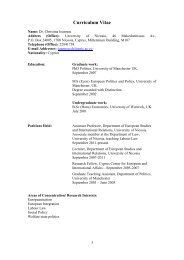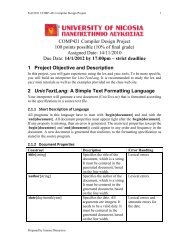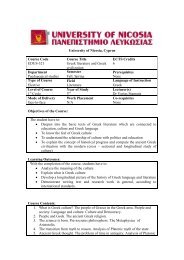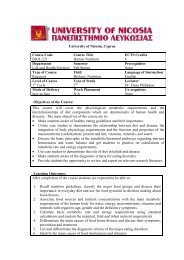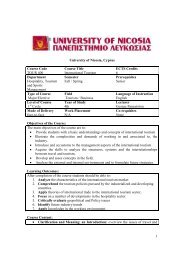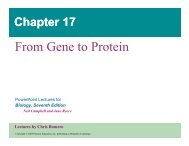Course Code Course Title Credits (ECTS) NUTR-585P Professional ...
Course Code Course Title Credits (ECTS) NUTR-585P Professional ...
Course Code Course Title Credits (ECTS) NUTR-585P Professional ...
Create successful ePaper yourself
Turn your PDF publications into a flip-book with our unique Google optimized e-Paper software.
<strong>Course</strong> <strong>Code</strong> <strong>Course</strong> <strong>Title</strong> <strong>Credits</strong> (<strong>ECTS</strong>)<strong>NUTR</strong>-<strong>585P</strong><strong>Professional</strong> Practices for 15Dietitians IIIDepartment Semester PrerequisitesLife and Health Fall<strong>NUTR</strong>-565PSciencesType of <strong>Course</strong> Field Language of InstructionRequired Dietetics/Nutrition EnglishLevel of <strong>Course</strong> Year of Study Lecturer2 nd Cycle 2 nd year Dr Eleni AndreouMode of Delivery Work Placement Co-requisitesN/A Yes (507 hours) NoneObjectives of the <strong>Course</strong>:The main objectives of the course are to: meet the needs of the patient, setting realistic goals and deliveringappropriate management programmes taking account of the availableresources evaluate how sociological and ethical issues affect patients appreciate the need for modification and flexibility in practice demonstrate the ability to function in clinical practice at The 3rdplacement build upon and integrate the learning undertaken in previous modules develop effective clinical reasoning processes across a range ofspecialities and clinical environments demonstrate the ability to function in clinical practice. build upon and integrate the learning undertaken in previous modules prepare to take up the role of independent and autonomouspractitioners further develop their ability to practice safely and effectively within theclinical setting demonstrate the ability to function in clinical practice at the 3rdplacement. build upon and integrate the learning undertaken in previousmodules.
Learning Outcomes:After completion of the course students are expected to be able toHave a knowledge and understanding of:evaluating the impact of resource availability on healthcare deliverythe organisation of healthcare provider unitsthe ethical issues pertinent to individuals within the healthcare systemevaluating how sociological issues affect patients, highlighting theneed for modification and flexibility in practicethe demands of clinical practice required to achieve the learningoutcomes specific to the 3rd clinical placement assessmentBe able to:demonstrate sensitivity to the patient's requirementsset realistic goals and plan an appropriate dietary managementprogramme in consultation with the patient and/or significant othersassess the way in which individuals take responsibility for their ownhealth and well being and how this may impact upon practiceevaluate the patient's response to lifestyle change/intervention andsuggest alternative strategies where appropriatecontribute, at an appropriate level, to inter-professional decisionmaking in order to enhance practiceHave a knowledge and understanding of:the problem solving approach to patient carethe application of the models of clinical reasoning in clinical practicehow to evaluate the use of clinical reasoning skills within their clinicalpracticethe demands of clinical practice required to achieve the learningoutcomes specific to the Level 6 clinical placement assessmentBe able to:implement a problem solving approach to the dietetic management ofpatientsapply subjective and objective assessment procedures safelyformulate a relevant problem list through the analysis of data gatheredduring the process of patient assessmentwrite an action plan and intervention programmeevaluate the patient's response to intervention and suggest alternativestrategies where appropriatework co-operatively with health and social care professionals and otheragencies
Have a knowledge and understanding of:evaluating the impact of resource availability on healthcare deliverythe organisation of healthcare provider unitsthe ethical issues pertinent to individuals within the healthcare systemevaluating how sociological issues affect patients, highlighting theneed for modification and flexibility in practicethe demands of clinical practice required to achieve the learningoutcomes specific to the 3rd clinical placement assessmentBe able to:demonstrate sensitivity to the patient's requirementsset realistic goals and plan an appropriate dietary managementprogramme in consultation with the patient and/or significant othersassess the way in which individuals take responsibility for their ownhealth and well being and how this may impact upon practiceevaluate the patient's response to lifestyle change/intervention andsuggest alternative strategies where appropriatecontribute, at an appropriate level, to inter-professional decisionmaking in order to enhance practiceHave a knowledge and understanding of:the multiple features presented by patients with complex pathology ornon-standard presentation of diseasethe demands of the varying and unpredictable circumstancesencountered in clinical practicethe demands of clinical practice required to achieve the learningoutcomes specific to the 3rd clinical placement assessmentthe use of clinical auditBe able to:adapt their working practice to meet the demands of the varying andunpredicatble circumstances encountered in clinical practicedevelop flexible, efficient and effective strategies by which to assessand manage patients' problemsimplement relevant treatment intervention programmes safely andeffectivelycontinually monitor and evaluate the effectiveness of dieteticintervention and respond in an appropriate mannerdemonstrate the skills and attributes required to achieve the learningoutcomes specific to the 3rd clinical placement assessment
<strong>Course</strong> Contents:This clinical education module focuses upon clinical reasoning processes in practice.Students will undertake the module in a variety of clinical settings providing themwith the opportunity to develop their competence in, and understanding of, clinicaldecision making across a range of specialties and clinical environments. This clinicaleducation module focuses upon patient centered practice. Students will be facilitatedto demonstrate sensitivity to the patient's requirements, both physical andpsychosocial, understand the need to prioritize problems by negotiation with patientsand/or significant others and evaluate the impact of resource availability onhealthcare delivery. Students will undertake the module in a variety of clinicalsettings providing them with the opportunity to develop their practice across a rangeof specialties and clinical environments. This clinical education module focuses uponclinical effectiveness, including clinical audit, in preparation for the students to takeup the role of independent and autonomous practitioners. Students will undertakethe module in a variety of clinical settings providing them with the opportunity todevelop their clinical effectiveness across a range of specialties and clinicalenvironments.Students will be allocated practice placements within clinical settings appropriate tothe level of study and profile of the individual student. Whilst undertaking this periodof clinical education, the focus of the students' learning will be clinical decisionmaking in practice. Designated clinical educators will facilitate the student's ability todevelop and implement a problem solving approach to patient care and case loadmanagement. In particular, the students will be encouraged, by both the clinicaleducators and academic staff, to reflect upon and evaluate the impact ofpsychosocial and cultural issues on the decision making process and the patient'sresponse to dietetic intervention. Students will be allocated practice placementswithin clinical settings appropriate to the level of study and profile of the individualstudent. Whilst undertaking this period of clinical education, the focus of the student'slearning will be the importance of patient centred practice, drawing upon aknowledge and understanding of psychosocial and ethical issues to highlightdilemmas encountered in practice. Students will be encouraged, by both clinicaleducators and academic staff, to evaluate how sociological and ethical issues affectpatients, appreciating the need for modification and flexibility in practice. In addition,clinical educators will facilitate the students ability to address the additional impact ofresource availability on healthcare management, reflecting upon situations in whichpatient requirements/wishes and professional standards may be compromised.Students will be allocated practice placements within clinical settings appropriate tothe level of study and profile of the individual student. Whilst undertaking this periodof clinical education, the focus of the student's learning will be clinical effectiveness,drawing upon an understanding of the demands of varying and unpredictablecircumstances encountered in practice. Students will be encouraged, by both clinicaleducators and academic staff, to develop flexible, efficient and effective strategies bywhich to assess and manage patients' problems, appreciating the need to practicesafely and effectively within the clinical setting. In addition, clinical educators willfacilitate the students ability to continually monitor and evaluate the effectiveness ofdietetic management and respond in an appropriate manner particularly whenaddressing issues presented by patients with complex pathology or non-standardpresentation of disease.
Learning Activities and Teaching Methods:Case study, PlacementAssessment Methods:This module will provide a maximum of 507 placement hours. Further Details:Assessment to consist of: 1.Practice education placement assessment (75%) madeup of 4 criteria: Interpersonal skills/communication (25%); professionalism (25%);clinical reasoning; (25%); dietetic intervention (25%). Each component is made up ofunderpinning learning outcomes. Each of the individual underpinning learningoutcomes must be passed at 60%. 2.<strong>Course</strong>work (25%) CPD coursework/case studylink to HPC standards. Practice education placement assessment must be passed.Case studies 25%<strong>Course</strong>work -Critical review of clinical75%placementRequired Textbooks/Reading:Authors <strong>Title</strong> Publisher Year ISBNHolland B McCance and6 thWiddowson’s TheComposition ofFoodsDept of Health Dietary Reference RSC -ValuesThomas and Manual of Dietetic HMSOBishop PracticeVera Todorovic Pocket Guide to4 th ISBN: 978-0-PEN Groupand Ann Clinical NutritionEdition 9529869-2-8PublicationsMicklewright2011FSA Food Portion Sizes 1988Sylvia Escott-StumpNutrition andDiagnosis – RelatedcareLippincottWilliams &Wilkins6 thedition2008
Recommended Textbooks/Reading:Authors <strong>Title</strong> Publisher Year ISBNGableCounselling skills for Blackwell 2007dietitiansBDAGetting started in0952986906research and auditHenley & Schott Culture, religion andpatient care in amulti-ethnic society –a handbook forprofessionals1999



